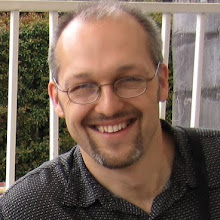it's a wierd thing about the five senses: we think of something as really real when we can hear it, touch it, or see it. Actually, that's not wierd: what's wierd is that it's very hard for us (in the West) to think of something as real which we can't touch or see.
I think that's a legacy of the So-Called Enlightenment. I love science--I was trained as a scientist, and though I found it difficult to do, I like the ways science trained me to think: to experiment, to explore reality, to search for what is real and how things work.
But the So-Called Enlightenment started us down a particular track. We began to measure whatever we could measure, categorize it, and so on. Soon we became obsessed, in my opinion, with what we could measure, to the point that we began to say that whatever could not be measured (in some way) is not real.
But can't we all name some real things which can't be touched, seen, or measured?
For example, love in all it's forms: romantic love, familial love, and the deep love of good friends. On the other hand, I think jealousy, hatred, and greed are also very real--realities which accost us every day.
Wikipedia's entry on The Enlightenment (click here to see it) does a good job of capturing the basic gist, and I'll quote from that:
"The intellectual leaders of this movement regarded themselves as courageous and elite, and regarded their purpose as leading the world toward progress and out of a long period of doubtful tradition, full of irrationality, superstition, and tyranny (which they believed began during a historical period they called the 'Dark Ages')."
Pre-So-Called Enlightenment people would say things like, "How does the world stay suspended? God holds it up." That kind of answer seems to ends scientific exploration, so thinkers rightly said that we shouldn't give that kind of an answer.
So in the name of Reason any belief in the supernatural has come be regarded as irrationality and superstition, which lead to close-mindedness and ultimately tyranny.
Love in all its forms has gotten slashed and hacked into merely sexual drives, survival and protection drives, and so on. Jealousy, hatred and greed have been deconstructed, too.
So here we are, "Enlightened" people: we don't think God is real or anything supernatural. We don't think love or hatred are real, just romantic interpretrations of physical drives we all have by instinct. Our "brightest thinkers" don't think communicating or even thinking are real anymore, either.
Isn't that an Endarkenment? Labels are so powerful. To label the previous era "The Dark Ages"--when people believed in God, spirits, the supernatural, and so on--exerted a great deal of power over us. I grew up picturing the people before the So-Called Enlightenment as ignoramuses who believed the world was flat (not true) and illogical. Reading authors from that time period is stunning--there were actually brilliant people whose insights into human nature and this world still provoke and cut deeply today!
In other words, the So-Called Enlightenment has led to sheer close-mindedness. Yes, we are open-minded to scientific discoveries. (In fact, don't we often irrationally and blindly accept anything from the latest studies, until later studies refute those? This seems like a different kind of "superstition" to me.)
But our minds are closed to anything we can't see, feel or touch. I think it's likely that far more of reality is unseen than seen. If that's so, we are closed-minded to the vast majority of knowledge and the most exciting possibilities for discovery!
Sunday, April 16
Subscribe to:
Post Comments (Atom)

6 comments:
Jon, what have you been reading lately? What would be useful for someone who wants to know about the brilliance of pre-enlightenment thinkers?
Lately? Hmm...not so many pre-enlightenment people recently. But here are some good places to start, I think:
1. Augustine's Confessions. Newer versions should have easier English. The man was BRILLIANT. His stuff on Genesis is really wierd, though. 4th century.
2. St. Francis de Sales--Introduction to a Devout Life. I thought modern psychology had opened up all these incredible insights. Here you see that he understood more about our soul and psyche than most modern psych programs teach, though their science was so primitive (he uses lots of scientific analogies which are pretty funny). 16th century.
3. St. Benedict--The Rule of Benedict. I haven't read all of it, but it's basically a manual for how to have a good Christian community. The sections to the Abbot are incredible--I think they would be very informative for any team leader or local pastor. Chock full'o'wisdom, though in an incredibly different context than ours. 6th century.
4. Thomas Aquinas is another brilliant pre-enlightenment thinker, 13th century.
Good stuff. Do you have any non-Christian thinkers you'd recommend?
I think there are probably many brilliant writers outside the Christian tradition pre-so-called-enlightenment. I am not familiar with many, however, other than Greek thinkers like Socrates, Plato and Aristotle. You could search the internet. I'm sure there are African thinkers (Augustine was African), Indian and Muslim writers you could find. Sun Tzu's book The Art of War shows incredible insight and brilliance--5th century BCE.
Hey Jon,
This is Payshun. I wanted to say hi. I have not forgotten about emailing you. I had to leave the conference early.
As per Abner's request, I would really recommend Rumi and a few other sufi poets. He's amazing.
I would also include Merton in there too. Check out my blog when you get a chance. There are definitely some things that you will find interesting. Oh please email me your email again @pashe_2001@yahoo.com.
Thanks
p
www.xanga.com/pashe/
Post a Comment